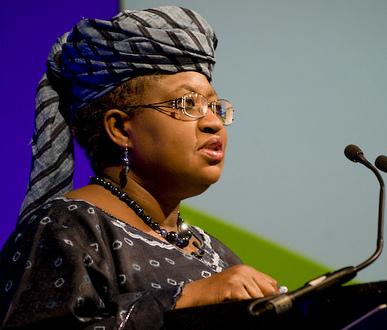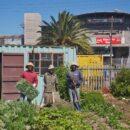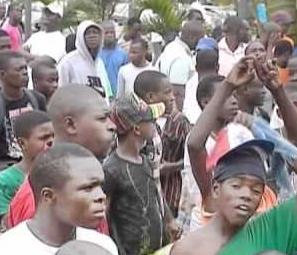Ngozi for President – By Richard Dowden

I made a mistake recently. When I read that President Obama had nominated Jim Yong Kim to be the next President of the World Bank, I assumed that was that. When does the hand over begin?
Now I read that this year, for the first time, it is not a done deal. The world’s two multinational institutions, the World Bank (which is actually a fund) and the International Monetary Fund (which is actually a bank) have been headed since their foundation after World War Two by an American and a European. At the Bank, the President is not voted in democratically, votes are weighted according to the amount of money each country puts into the Bank. So America gets to cast 16.41 % of the votes. Is that all? No. Here is the catch. The 185 board members have to agree a candidate by an 85% majority. If this wheeze had been cooked up by the Soviet Union or Communist Albania or Mao’s China we would all be furrowing our brows and tut tutting about democracy and transparency. This is a shabby wheeze by western countries to keep a grip on the world economy. The Europeans get to nominate the head of the IMF on a similar principle.
This year there is a really good candidate: Ngozi Okonjo Iweala. She is highly competent, energetic with a real vision of what the bank should be doing. But she is African – the Nigeria Finance Minister. The World Bank will be judged on the success or failure by what it does in Africa. She has the backing of the African Union.
It would be a hugely symbolic appointment. In the 1990s Africa was handed over to the World Bank which imposed structural adjustment on its economies. They certainly needed reform, but with no sense of the social or political implications, the economists of the bank, backed by Western countries, dismantled Africa’s states. In the “˜triumph’ of the Western capitalist model over the Soviet Union, the orders were to clear away state structures and open up the countries to compete for investment in the free market. The sharper the shock the shorter and more effective it would be.
Key institutions of new and fragile states, barely one generation old, were dismantled. Thousands of people were thrown out of work and spending on health and education declined dramatically. As governments weakened, rebellions and wars broke out. I count 24 new or reignited civil wars in Africa in that decade and an appalling rise in poverty. In human terms it was possibly one of the greatest economic crimes of the 20th century. The investment that was supposed to flow in never came. Few investors were willing to put their money in a continent with such a terrible reputation for war, chaos and corruption. In many places that reputation was true, but not all of Africa’s countries were at war and investors who found their way to the peaceful ones saw their money multiplying rapidly.
The Bank led the way on structural adjustment. Its reforms may have helped in the long run to bring investment, but what really turned Africa’s economies round was China’s decision to buy its raw materials from the continent. That, combined with the arrival of mobile phones, and the rise of a new African middle class, has given Africa more than 10 years of growth. In 2008 the Western free market model exploded and since then the US and Europe have demonstrated neither success in their own economies nor found a new theoretical model to impose on others through the Bank and the Fund.
In the past, the Bank’s presidents have either been visionaries that inspire but can’t always follow through – men like Robert McNamara and James Wolfensohn – and dull bureaucrats like Barber Conable and Lewis Preston. The present president, Robert Zoellick, is another in that mould. I went to a talk he gave last year. A nice man I thought but as colourless and lacking in vision as it is possible to be. I was recently asked to talk to the Bank’s Africa team on an “˜away day’ in Washington. I found them very welcoming, sharp on the details and generally concerned and engaged in Africa. But they were troubled by whether the Bank was really doing the right things or not. They were waiting nervously for the new boss to be appointed. Most of the day was spent trying to measure and evaluate what the Bank does -which looked to me like an exercise in economic navel-gazing. The only time I sensed real passion was when someone suggest that Jeff Sachs might be their next president.
So what better moment to appoint Ngozi? She has already laboured in the dull desert of the Bank’s Washington offices and twice walked unscathed through the terrifying valley of Nigerian politics. She retains a strong vision of development for people, not for ideologies or theories. It’s time for America to listen to others – especially Africa. Mr Obama, are you listening?
Richard Dowden is Director of the Royal African Society. He is author of Africa: altered states, ordinary miracles.








[…] on the success or failure by what it does in Africa. She has the backing of the African Union. Â Read more… Share this:ShareTwitterFacebookLike this:LikeBe the first to like this post. This entry was […]
I certainly wouldn’t say that Ngozi walked unscathed from Nigerian politics – she is very unpopular for backing the attempted removal of the fuel subsidy, which ended in complete disaster.